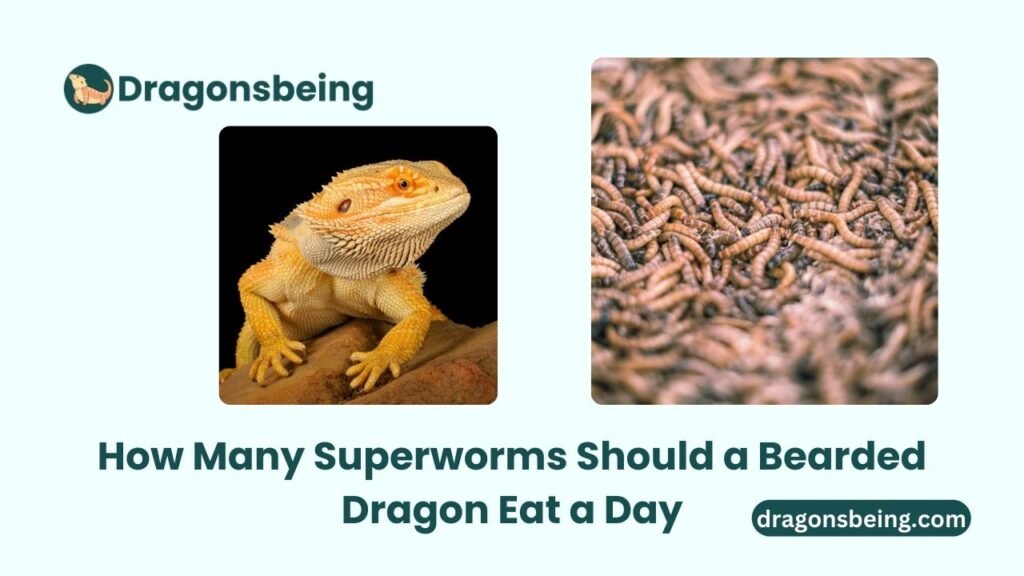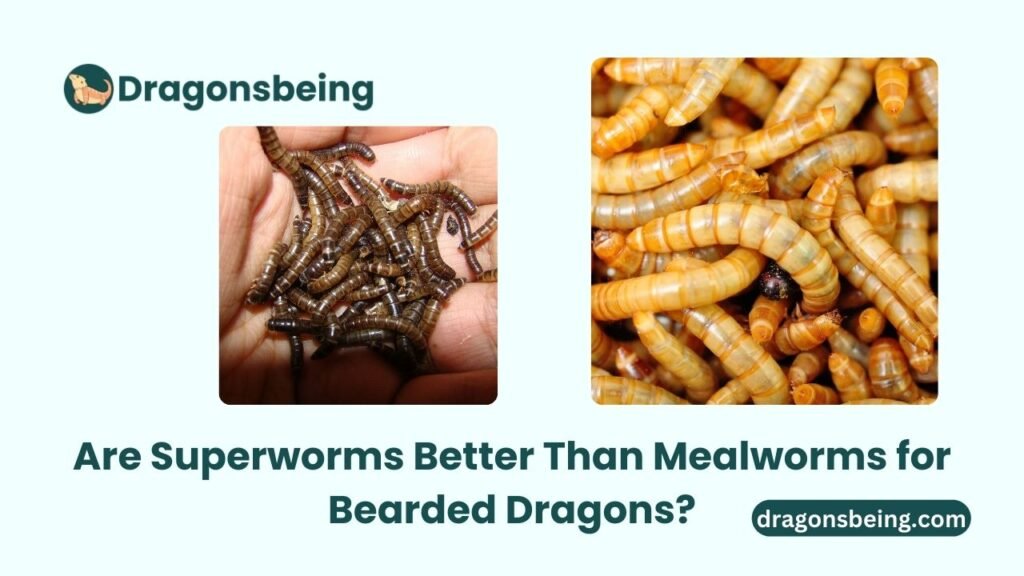Worms that are good for bearded dragons include mealworms and waxworms. These worms provide essential nutrients and can be a tasty treat.
Bearded dragons thrive on a varied diet to ensure their health and well-being. Choosing the right worms is crucial for their growth and energy levels.
Mealworms serve as a protein-rich option, while waxworms are high in fat, making them perfect for occasional feeding.
Both types of worms can stimulate your beardie’s appetite and provide enrichment.
It’s important to offer these worms in moderation, as they shouldn’t replace staple foods like leafy greens and vegetables.
Safe Worm Varieties For Bearded Dragons
Choosing the right worms for your bearded dragon is crucial. Some worms provide excellent nutrition. Others can cause health issues. Here are two safe worm varieties to consider.
Black Soldier Fly Larvae
Black Soldier Fly Larvae are a fantastic option. They are rich in protein and calcium. These worms promote healthy growth and vitality.
- High in protein
- Great source of calcium
- Low in fat
- Easy to digest
Black Soldier Fly Larvae are also a favorite among bearded dragons. They are very palatable and easy to find. Consider feeding them as a treat or staple food.
Silkworms: A Nutrient-rich Option
Silkworms are another excellent choice. They are packed with essential nutrients. These worms are soft and easy to eat.
| Nutrient | Amount per 100g |
|---|---|
| Protein | 35g |
| Calcium | 90mg |
| Fat | 5g |
Silkworms also help with hydration. They contain a good amount of moisture. This is beneficial during hot weather.
- Excellent hydration source
- Encourages healthy growth
- Variety in diet
Both Black Soldier Fly Larvae and Silkworms are safe. They provide excellent nutrition for your bearded dragon. Rotate these worms in their diet for the best results.
Mealworms: A Popular But Controversial Choice
Mealworms are a common food choice for bearded dragons. They are easy to find and packed with protein. However, they come with some concerns. Let’s explore the risks and safe ways to include them in your beardie’s diet.
Risks Of Feeding Mealworms
Mealworms may pose several risks for your bearded dragon.
- Chitin Content: Mealworms have a tough outer shell. This chitin can cause digestive issues.
- Fat Content: They are high in fat. Too much fat can lead to obesity.
- Calcium Ratio: Mealworms are low in calcium. A calcium deficiency can harm your beardie’s health.
- Potential for Impaction: Feeding too many mealworms may cause impaction. This can be serious and requires vet care.
How To Safely Include Mealworms In The Diet
Follow these tips to safely add mealworms to your beardie’s meals:
- Limit Quantity: Offer mealworms as an occasional treat.
- Mix with Other Foods: Combine mealworms with leafy greens and veggies.
- Gut-Load: Feed mealworms nutritious foods before giving them to your beardie.
- Monitor Health: Watch for signs of obesity or digestive problems.
Mealworms can be part of a balanced diet. Use caution and moderation.
The Benefits Of Feeding Earthworms
Feeding earthworms to your bearded dragon can be very beneficial. These wriggly creatures are packed with nutrients. They provide essential vitamins and minerals. Earthworms can enhance the health and vitality of your beardie.
Let’s explore the specific benefits of earthworms.
Nutritional Profile Of Earthworms
Earthworms offer a rich nutritional profile. They contain protein, fat, and fiber. Here’s a detailed breakdown:
| Nutrient | Amount per 100g |
|---|---|
| Protein | 60-70g |
| Fat | 10-15g |
| Fiber | 5-10g |
| Calcium | 0.5-1.5g |
| Phosphorus | 0.2-0.5g |
Earthworms are low in fat. They provide essential amino acids. They are a great source of calcium and phosphorus. These nutrients support healthy bone growth.
How To Source And Serve Earthworms
Getting earthworms for your beardie is easy. You can find them at pet stores or online. Ensure they are fresh and free from chemicals. Here are some tips:
- Purchase from reputable suppliers.
- Avoid wild-caught worms due to pesticides.
- Store worms in a cool, dark place.
To serve earthworms:
- Rinse them gently to remove dirt.
- Cut larger worms into smaller pieces.
- Mix them with other foods for variety.
Start by offering a small amount. Monitor your beardie’s reaction. Adjust serving sizes based on your pet’s preference.
Waxworms As An Occasional Treat
Waxworms are a popular treat for bearded dragons. They are soft, fatty, and tasty. These traits make them appealing to many reptiles. However, they should be given in moderation.
Why Moderation Is Key With Waxworms
Waxworms are high in fat. Too much fat can lead to health problems. Here are some reasons to limit waxworms:
- Obesity Risk: Excess fat can cause obesity.
- Digestive Issues: Too many waxworms can upset digestion.
- Nutritional Imbalance: They lack essential nutrients.
Feeding waxworms too often can create bad habits. Beardies may refuse healthier options. Balance is essential for a healthy diet.
Integrating Waxworms Into A Feeding Schedule
Include waxworms as a special treat. Here’s how to do it effectively:
- Offer waxworms once or twice a week.
- Mix them with other insects like crickets or mealworms.
- Limit the quantity to 3-5 waxworms per feeding.
- Observe your beardie’s reaction and adjust accordingly.
Use waxworms to encourage feeding during picky times. They can help entice your beardie to eat.
Keep a feeding log. Track what your beardie eats. This will help manage their diet effectively.
| Treat Type | Frequency | Quantity |
|---|---|---|
| Waxworms | 1-2 times a week | 3-5 worms |
| Crickets | Daily | 10-15 insects |
| Mealworms | 2-3 times a week | 5-10 worms |
Incorporate waxworms wisely. They add excitement to your beardie’s diet. Remember, variety is key for overall health.
Dubia Roaches: An Excellent Worm Alternative
Bearded dragons, or beardies, thrive on a varied diet. While worms are popular, Dubia roaches offer a fantastic alternative. They provide essential nutrients and are easy to digest. This makes them a great choice for pet owners.
Nutritional Advantages Of Dubia Roaches
Dubia roaches are packed with nutrients. They are high in protein and low in fat. This helps maintain a healthy weight in beardies. Here’s a detailed comparison of Dubia roaches and common worms:
| Nutrient | Dubia Roaches | Mealworms |
|---|---|---|
| Protein | 21% | 20% |
| Fat | 7% | 13% |
| Calcium | 0.9% | 0.6% |
Dubia roaches also contain vitamins. These include B vitamins, which help in energy production. They are a great source of hydration as well. Beardies benefit from their moisture content.
Introducing Dubia Roaches To Your Beardie
Introducing Dubia roaches to your beardie is easy. Follow these steps for a smooth transition:
- Start with a small number of roaches.
- Mix them with their current food.
- Observe your beardie’s reaction.
- Gradually increase the amount over time.
Offer a variety of sizes. Younger beardies enjoy smaller roaches. Older ones can handle larger ones. Always supervise feeding to prevent choking.
Store Dubia roaches in a proper container. Keep them in a warm, dark place. Ensure they have food and water. This will keep them healthy for your beardie.
Preparing Worms For Your Bearded Dragon
Feeding worms to your bearded dragon is a great choice. Proper preparation enhances their nutritional value. Follow these simple steps for safe and healthy feeding.
Gut Loading For Enhanced Nutrition
Gut loading is the process of feeding worms nutritious food before giving them to your beardie. This increases the vitamins and minerals your pet receives. Here’s how to gut load effectively:
- Choose healthy worms like mealworms or superworms.
- Feed them high-quality foods such as:
| Food Type | Nutritional Benefits |
|---|---|
| Leafy greens | High in calcium and fiber |
| Carrots | Rich in vitamins and antioxidants |
| Squash | Excellent source of vitamins A and C |
Allow worms to eat this food for 24-48 hours. This time frame lets the worms absorb nutrients. Feed your bearded dragon the gut-loaded worms for better health.
Safe Handling And Storage Practices
Safety is key when handling worms. Always wash your hands before and after touching worms. Use these tips for safe handling:
- Keep worms in a clean container.
- Store them in a cool, dry place.
- Check for dead worms regularly.
Proper storage prevents bacterial growth. It also keeps your worms healthy for feeding. Follow these guidelines for the best results:
- Use a breathable container.
- Avoid overcrowding worms.
- Provide fresh food and water.
These practices ensure your bearded dragon gets safe and nutritious worms.
Monitoring Your Bearded Dragon’s Health
Keeping an eye on your bearded dragon’s health is crucial. Proper nutrition helps them thrive. Worms play a vital role in their diet. They provide essential proteins and nutrients.
Signs Of Nutritional Balance
Watch for signs that your bearded dragon is healthy. Here are some key indicators:
- Active Behavior: A healthy dragon is lively and curious.
- Good Appetite: They should eat regularly and show interest in food.
- Healthy Shedding: Look for smooth, even shedding.
- Bright Eyes: Clear, bright eyes indicate good health.
- Proper Weight: They should not be too thin or overweight.
Monitor their poop as well. Normal feces should be firm and moist. Dark brown color is a good sign.
When To Consult A Veterinarian
Consult a vet if you notice any of these signs:
- Lethargy: Your dragon is unusually inactive.
- Loss of Appetite: They refuse to eat for more than a day.
- Abnormal Poop: Diarrhea or very hard feces.
- Weight Loss: Sudden or continuous weight loss.
- Swollen Belly: Any swelling can indicate problems.
Early detection helps in treatment. Regular check-ups can prevent serious issues.
Frequently Asked Questions
What Types Of Worms Are Safe For Beardies?
Wax worms, mealworms, and superworms are safe and nutritious options for bearded dragons.
Can Bearded Dragons Eat Earthworms?
Earthworms are generally safe but should be given in moderation due to potential parasites.
How Often Should I Feed Worms To My Beardie?
Feed worms as a treat, no more than once or twice a week to maintain a balanced diet.
Are Wax Worms Good For Beardies?
Yes, wax worms are high in fat and can be a tasty treat, but should not be a staple.
Should I Gut-load Worms Before Feeding?
Gut-loading worms before feeding increases their nutritional value, benefiting your bearded dragon’s health.
What Is The Best Worm For Baby Beardies?
Small mealworms or finely chopped wax worms are excellent choices for baby bearded dragons.
Conclusion
Choosing the right worms for your beardie is essential for their health. Black soldier fly larvae, mealworms, and waxworms can provide valuable nutrition. Always balance these treats with a varied diet. Regularly monitor your pet’s health to ensure they thrive.
Happy feeding and enjoy watching your bearded dragon flourish!

Hi, I’m Dr. Michelle Mayers, a veterinary professional with a deep passion for animal health and well-being. Over the years, I’ve dedicated my life to caring for animals and helping pet owners better understand their furry, feathered, or scaly companions. On my blog, Dragonsbeing, I share insights, tips, and stories that aim to educate, inspire, and connect with fellow animal lovers. Join me at Dragonsbeing as we explore the fascinating world of veterinary care and celebrate the special bond between humans and animals!


